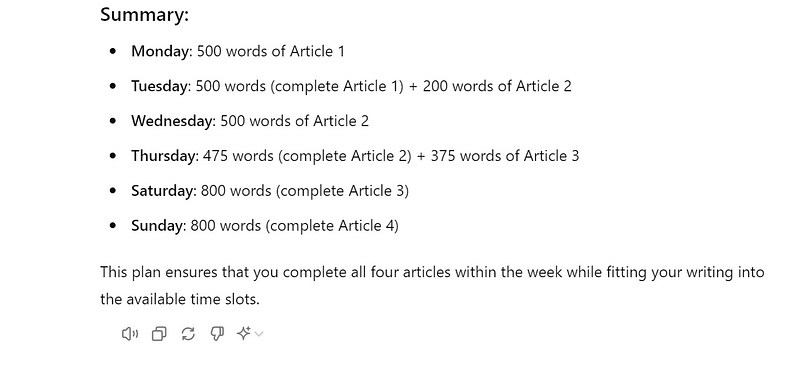Transform Your Writing Skills with AI: Six Innovative Techniques
Written on
Chapter 1: Introduction to AI in Writing
In this discussion, we will explore how to effectively utilize AI tools to enhance productivity and engage your audience. While this guide won't delve into using AI for actual writing—something I personally don't endorse due to concerns over creativity—it's clear that AI can significantly aid in the writing process.
AI can streamline your workflow, enhance fluency, and increase engagement. I regularly employ various free AI programs and have devised strategies to harness their benefits. Below are six methods to elevate your writing skills using AI, along with recommended tools.
Section 1.1: Crafting a Writing Plan
Preparation is key to boosting productivity. Whether you're preparing to edit or establish a writing schedule, knowing your objectives allows for a smoother writing process. Ideal tools for this task include ChatGPT and Claude.
Steps for Creating an AI-Driven Writing Plan:
- Set Specific Goals: Determine how many words or posts you aim to write weekly and the focus of your plan.
- Outline Your Schedule: Clearly state your available writing time.
- Assess Your Writing Speed: Understand how long it typically takes you to write or edit a set word count.
For instance, a prompt for a weekly writing plan could be:
"Create a weekly writing plan aiming for four articles of 800 words each. It takes me about an hour to write 500 words, and I have an hour daily for writing except on weekends, when I have two hours each day."
ChatGPT can generate an organized plan based on this input.

Section 1.2: Ensuring Originality
Maintaining originality in writing is essential. The last thing you want is to be accused of plagiarism. Grammarly is an excellent tool for this purpose, checking your work against numerous online sources and academic papers to ensure uniqueness.
Section 1.3: Enhancing Vocabulary
The choice of words can make or break your connection with readers. Using impactful, sensory verbs can captivate your audience. Tools like ChatGPT and Claude can help you discover synonyms, antonyms, and strong verbs to enrich your writing.
Section 1.4: Visualizing Concepts
Creating images to accompany your writing can enhance descriptions and clarify ideas. Midjourney and Copilot are fantastic for generating visuals based on your prompts. For instance, you can request a fantasy-themed image depicting rival kingdoms.

Chapter 2: Leveraging AI for Research and Learning
The first video, "6 AI-powered Writing Tools To Help You Write Better," provides a comprehensive overview of how AI can enhance your writing process.
Section 2.1: Conducting Thorough Research
In-depth research is crucial for producing reliable content. Perplexity simplifies this process, providing curated information relevant to your queries. Use it to gather insights efficiently, improving the depth of your writing.
Section 2.2: Summarizing Educational Content
YouTube is a treasure trove of knowledge. Although I recommend immersing yourself in videos, Gemini can be a quick tool for summarizing content if you're short on time.
The second video, "10 AI Prompts That Will Make You a BETTER Writer," offers valuable prompts to inspire your writing journey.
Section 2.3: Final Thoughts on AI Usage
While AI can enhance productivity and broaden our knowledge, it shouldn't replace the joy of writing. It's essential to strike a balance between leveraging AI tools and engaging in the writing process personally.
If you found this guide helpful, consider following for more writing tips. Until next time!